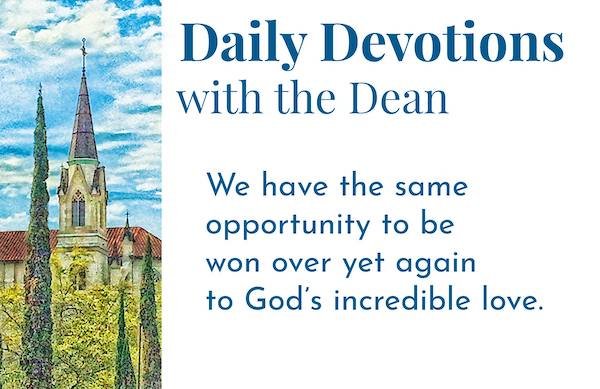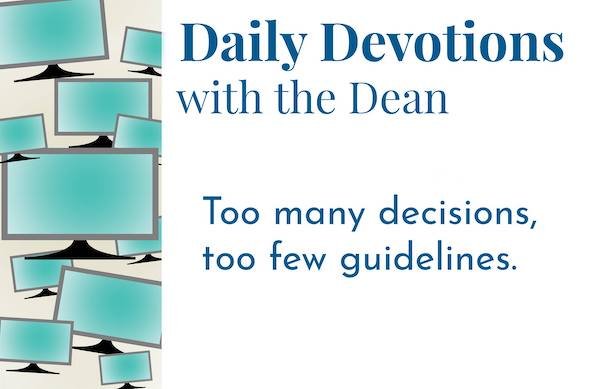Monday • 10/16/2023 •
Monday of the Twentieth Week After Pentecost (Proper 23)
This morning’s Scriptures are: Psalm 1; Psalm 2; Psalm 3; Jeremiah 36:11–26; 1 Corinthians 13:1–13; Matthew 10:5–15
This morning’s Canticles are: following the OT reading, Canticle 9 (“The First Song of Isaiah,” Isaiah 12:2–6, BCP, p. 86); following the Epistle reading, Canticle 19 (“The Song of the Redeemed,” Revelation 15:3–4, BCP, p. 94)
Welcome to Daily Office Devotions, where every Monday through Friday we explore that day’s Scripture readings, as given in the Book of Common Prayer. I’m Reggie Kidd. Thanks for joining me. This Monday in the Season After Pentecost our readings finds us in Proper 23 of Year 1 in the Daily Office Lectionary.
Into the Corinthians’ confusion over the terms of their new life in Christ — they think Christ has come to baptize their social snobbery, bless their spiritual vanity, and endorse their assertion of their “rights” — into their confusion, Paul drops a clarity-bomb. Life in Christ’s kingdom, life in this new world, is about one thing: love. In one of the most splendid passages he is ever to compose, Paul crisply describes the contours of the life that has taken hold of them in Christ.
“Love is patient.” Love doesn’t stand there tapping its toe with arms crossed, and saying, “Come on already!” Paul’s Μακροθυμεῖ (makrothumei) is close to Exodus 34:6’s self-description of Yahweh: “slow to anger” (LXX, μακρόθυμος, makrothumos). Meaning: love isn’t quick on the trigger. Love’s on-ramp to anger is lllllloooonnnngggg.
“Love is kind.” χρηστεύεται (chresteuetai). To the Greek ear, this particular use of the root word “kind” (χρηστ-, chrest-) would have sounded like the making of a verb out of the title, “Christ.” Christ’s people act in ways that remind people of the One who brought kindness from heaven to earth.
“Love is not envious.” Love isn’t resentful at somebody else’s happiness. Love doesn’t begrudge someone else’s success. Love doesn’t get upset when somebody else does well.
“Love is … not boastful.” Love isn’t in the self-promotion business. The word here is one of Paul’s strongest: it’s περπερεύεται (perpereuetai). It occurs only here in the Bible, but is fairly frequent in contemporary literature: “to heap praise upon oneself; to be a braggart or a windbag.” You bet Paul knew a bunch of those folks in First Church “We Have Become Kings” in Corinth!
“Love is … not arrogant.” Love isn’t “puffed up” (literally), that is, it doesn’t have a bloated ego or inflated view of itself, especially at the expense of someone else. Love isn’t contemptuous, or disdainful of others.
“Love is … not rude.” This word might better be rendered “crude” or “indecent.” The Greek is οὐκ ἀσχημονεῖ (ouk aschemonei), and it means “behave disgracefully, dishonorably, indecently.” Love does not treat anyone in a demeaning, disgraceful, dishonorable, or indecent way. An apt word in a world of #MeToo and #ChurchToo.
“Love … does not insist on its own way.” Love’s default is: “Happy to do it your way.”
“Love is … not irritable.” We get “paroxysm” from this Greek word. Violent convulsions of rage don’t leave much room for love.
“Love is … not resentful.” The Greek here (οὐ λογίζεται τὸ κακόν, ou logizetai to kakon) means: “Love doesn’t keep score, counting up offenses, readying a payback.”
“Love … does not rejoice in wrongdoing.” Put in the positive, love grieves when it sees injustice, and does not sit idly by when wrongdoing is on the rise.
“Love … rejoices in the truth.” Love says, “Yes!” to the real. Love knows that philosopher-theologians Thomas Aquinas and Josef Pieper are right: as the Father begets the Son and the Holy Spirit proceeds from the Father and the Son, “Being” leads to “Truth” leads to “Justice.” Which is why love delights in the progression of the Eucharistic prayer: “… out of error into truth, (then) out of sin into righteousness, (then) out of death into life.”
“Love … bears all things.” The relevant meaning for the verb στέγειν (stegein) is “keep confidential, cover, pass over in silence.” Theologian-historian Adolf Harnack is hard to beat here: Love “throws a cloak of silence over what is displeasing in another person.”
“Love believes all things.” Love is ready to extend (wise) trust. As Dietrich Bonhoeffer says, “We have learnt never to trust a scoundrel an inch, but to give ourselves to the trustworthy without reserve” (“After Ten Years: A Reckoning made at New Year 1943,” p. 12). May we be surrounded by those worthy of trust. May we, by the mercy and grace of God, prove worthy of the same.
“Love hopes all things.” Life sure feels different when you always expect … at least, in the end … a happy ending.
“Love endures all things.” Because happy endings sometimes are a long way off, and it can be a grind getting to them.
Be blessed this day,
Reggie Kidd+













